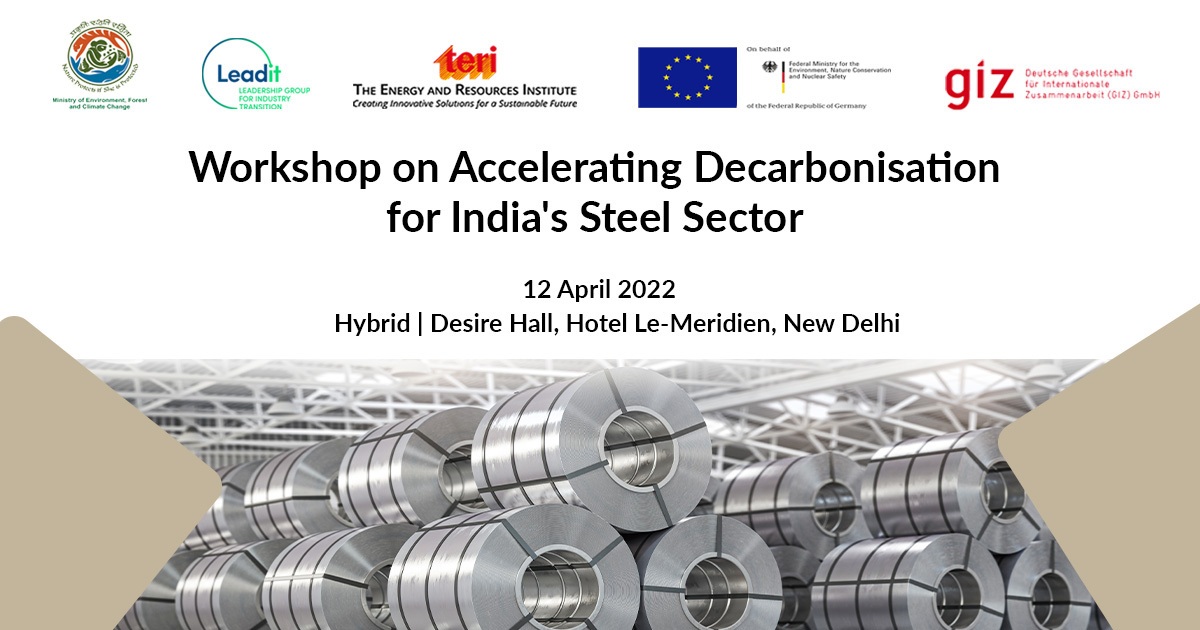Workshop on Accelerating Decarbonisation for India's Steel Sector

On 12th April 2022 | 09:30 hrs – 16:30 hrs IST
The Energy and Resources Institute (TERI) with the LeadIT Secretariat, Ministry of Environment, Forest and Climate Change (MoEFCC), and the Strategic Partnership for the Implementation of Paris Agreement (SPIPA) project are hosting a road mapping workshop in New Delhi, India to construct realistic decarbonisation pathways for hard-to-abate sectors. The workshops aim to bring together actors across the entire sectoral value chain including civil society, unions and government officials to discuss and deliberate on pathways that foster deeper decarbonization.
Roadmapping workshops offer an opportunity to set out the timing and sequencing of policy, investment, and innovation in ways that reduce the risk of industries being locked into higher emission trajectories due to the lifespan of assets. Industry transition roadmaps can also serve as analytical tools for understanding, framing, and shaping these complex transition processes.
LeadIT has committed to aiding in roadmapping processes in India in cement sector through facilitating dialogues and offering technical and methodological guidance for developing roadmaps, such as the “Roadmap Planner”.
LeadIT Secretariat and TERI, supported by GIZ India, are jointly hosting this roadmapping process. TERI’s work strengthens the understanding of potential pathways to reduce emissions from the heavy industry sectors. This includes analytical work and discussion with industry representatives in a number of key sectors, to inform practical roadmaps for decarbonisation.
The low carbon roadmaps for the hard to abate sectors are under development and aligned to the following objectives:
- Conducting technical analysis to support India’s contributions to the “Leadership Group for Industry Transition”
- Conducting sectoral studies for hard-to-abate Industry sectors in consultation with Ministries and key stakeholders
Steel and cement sectors are essential in modern economies and societies. They are also major emitters and have long been treated as “hard to abate” industries. There are technological solutions within reach that would allow for close to zero-emissions production of steel and cement if the right policies and investments are in place – sequence of actions and public-private alignment are of great importance for a successful transition. Industry transition roadmaps can serve as analytical tools for understanding, framing, and shaping these complex transition processes. For sectoral and national roadmaps around the world, see the Industry Transition Tracker.
Day 2: Decarbonization of the steel industry. (Tuesday, 12 April 2022 at 09:30 hrs – 16:30 hrs IST)
The second day will be all about decarbonizing the steel industry. In the first part of the workshop, we will set the scene with an overview of the state of sustainability of iron and steel industries in India, availability and costs of technologies necessary for the transition, and present the Low-carbon Roadmap for Indian Steel Sector report drafted by TERI.
In the afternoon, participants will share experiences of fossil free steel projects from around the world and will work on setting transition targets and mapping out needs, opportunities and challenges for industry transition within the key areas of policy, finance and technology. The day will close with a plenary discussion.
Participation in the workshop is by invitation only. Pre-registration is necessary. For additional details, write to taruna.idnani@teri.res.in

